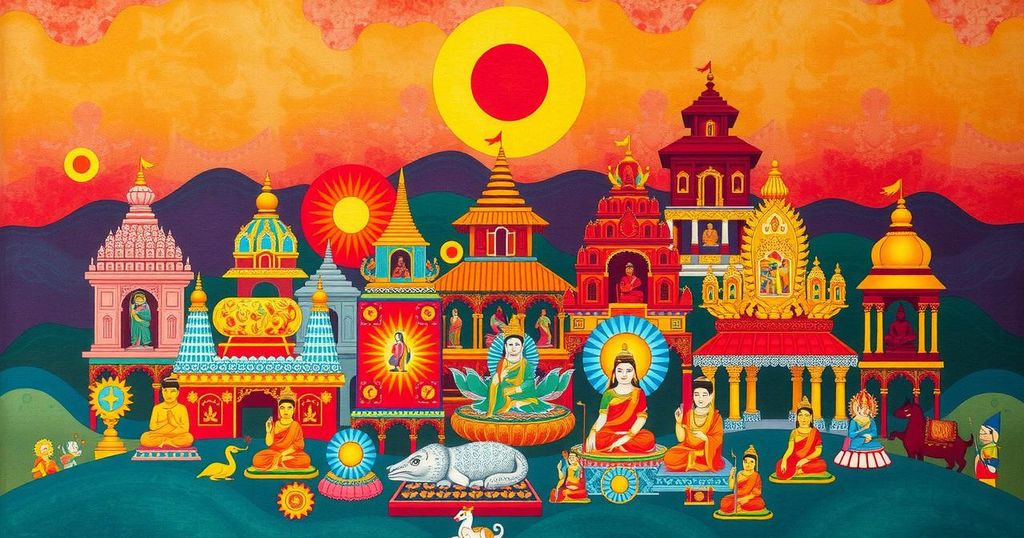World news
2024 ELECTIONS, ASIA, BANGLADESH, BANGLADESH BUREAU OF STATISTICS, BARACK OBAMA, BIHAR, DEMOGRAPHICS, ELECTIONS, EMMANUEL MACRON, EUROPE, FRANCE, IAN, INDIA, INDIAN NATIONAL CONGRESS, LABOUR PARTY, NEW DELHI, NORTH AMERICA, PUBLIC SERVICE, RU, RUDRA MUKHERJEE, UK, UNITED KINGDOM, UNITED STATES, VOTER TURNOUT, VOTING INTENTIONS, WEST BENGAL
Oliver Grayson
0 Comments
Hindu Voters as a Decisive Factor in Bangladesh’s Upcoming Elections
Hindu voters in Bangladesh, comprising around eight percent of the population, may wield significant influence in upcoming national elections. Their historical support for the Awami League is waning due to ongoing persecution, prompting a shift towards alternative political parties. As parties recognize this dynamic, those addressing minority rights could gain advantage in electoral politics.
In democratic systems, minority voters regularly emerge as a critical component in elections, particularly when they constitute between five to fifteen percent of the electorate. Their preferences can profoundly affect electoral results, determining the political party that gains power. This pattern is evident in nations such as the United States, France, India, and the United Kingdom.
In the United States, minority groups, including African Americans, Latinos, and Asian Americans, represent nearly thirty percent of voters. Their support played a pivotal role in Barack Obama’s presidential victories in 2008 and 2012. Similarly, in India, where minorities constitute approximately fifteen percent, their voting power is particularly influential in states like Bihar and West Bengal, significantly impacting the Indian National Congress and other parties reliant on Muslim voter support. In the UK, minorities of South Asian, African, and Caribbean descent account for about fourteen percent of the populace, historically favoring the Labour Party. In France, the Muslim demographic, representing roughly nine percent, has become essential in presidential elections, swaying candidates including Emmanuel Macron. These instances highlight the integral role of minority voters within global democracies.
In Bangladesh, Hindu voters have a comparable impact on electoral outcomes and have historically been a significant force in national elections. As of 2022, Hindus comprise approximately eight percent of the country’s population, totaling around thirteen million individuals, according to the Bangladesh Bureau of Statistics. Despite a decline in their population percentage over fifty years, their absolute numbers have notably increased, growing from 9.6 million in 1974 to 13.5 million in 2022.
Traditionally, a substantial portion of Hindu voters has supported the Awami League, perceiving it as a champion of secularism and minority rights. However, instances of persecution, land confiscation, and communal violence have persisted even under Awami League governance. The party maintains its platform of protecting minority rights and promoting secularism, drawing upon its legacy from the 1971 liberation war.
To comprehend Hindu voting patterns, it is vital to acknowledge their political, economic, and security concerns. The assurance of safety for minorities is paramount for any party vying for their allegiance. Hindu voters tend to support those who can guarantee their protection, making policies regarding minority welfare and local leaders’ attitudes crucial for building voter confidence.
Post the Awami League government’s fall on August 5 of the previous year, the Hindu community faced renewed persecution. Attacks on homes and businesses severely affected their sense of security, echoing past events in 1971, 1992, and 2001. Analyzing past electoral data illustrates the pivotal role Hindu voters have played in parliamentary elections, with election outcomes often closely contested between the Awami League and the Bangladesh Nationalist Party (BNP). Other parties, such as the Jatiya Party and Jamaat-e-Islami, have consistently obtained only 5-6 percent of the vote, making the eight percent Hindu vote highly consequential. Studies indicate that Hindu voters can influence the election results in eighty-eight constituencies nationally, with significant populations in districts such as Gopalganj and Khulna.
Although the Awami League has historically enjoyed support from Hindu voters, incidents of persecution from 2008 to 2022 have fueled dissatisfaction within the community, prompting them to explore alternative political parties. Recognizing the shift, parties like the BNP and the National Citizens’ Party (NCP) are increasingly focusing on appealing to Hindu voters. Notably, the BNP, which had previously employed anti-Hindu rhetoric, altered its stance in the 2018 elections by proposing protections for religious minorities.
As the interim government anticipates holding national elections in December, political parties are strategizing to attract Hindu voters, who are more united and aware than in past elections. Since August 5, the Hindu community has mobilized to express their concerns publicly. Therefore, any party that develops and implements authentic policies safeguarding minority rights may harness Hindu voter support as a critical asset in the electoral arena.
Historically, the Hindu community’s initial trust in the Awami League stemmed from shared ideals during the Liberation War. However, trust has waned over time due to administrative shortcomings and local-level violence involving party leaders. Despite constitutional guarantees of secularism, there remains an absence of specific protective laws for minorities. The continuation of the ‘Vested Property Act,’ which has historically facilitated the appropriation of Hindu property, complicates land ownership issues for this community. Thus, a political party that can genuinely ensure security and equality for minorities may find Hindu voters aligning with them, potentially influencing the forthcoming elections significantly.
In summary, Hindu voters in Bangladesh possess the potential to be a decisive force in the nation’s elections, particularly as minority representation becomes increasingly critical. Despite historical ties to the Awami League, rising dissatisfaction due to persecution has opened the door for alternative political options. With the upcoming elections, parties that authentically prioritize minority rights and safety may gain substantial support from the Hindu electorate, thus enhancing their electoral prospects.
Original Source: www.awazthevoice.in




Post Comment